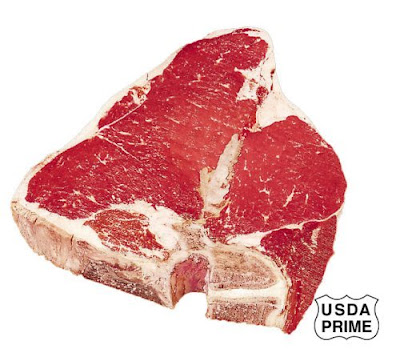
Booming back-alley sales for U.S. beef in S.Korea
Reuters, Kuly 2, 2008
By Kim Junghyun
SEOUL, July 2 (Reuters) - U.S. beef returned this week to South Korea for the first time in nine months, but consumers may be hard-pressed finding the one store that is happy to let the public know that it is selling it.
No major retailer has put U.S. beef on its shelves due to street protests sparked by fears of mad cow disease and surveys showing that most South Koreans do not feel the product is safe.
But down an alley in a working class Seoul neighbourhood, a butcher shop about the size of two compact cars proudly displays U.S. beef in its cramped showcase.
"If customers are looking for U.S. beef, isn't it the responsibility of importers to provide it," asked Park Chang-kyu, who heads A-Meat and a local meat importers' association.
No other store has announced to the media that it is selling U.S. beef and A-Meat has been doing a booming business with its regular customers who are attracted by prices that are less than half of Korean beef.
Customers have told local media they have relatives in the United States eating U.S. beef and they see the product as safe.
The store sold out its initial supply of about 400 kgs (900 lbs) of beef when it first went on sale on Tuesday, Park said.
Park said he has received some threats, lots of inquiries and can list South Korea's prime minister as one new customer.
South Korea has seen street protests on nearly every night since early May against a deal to import U.S. beef.
The protests were first among those concerned about mad cow infection but later turned into a lightning rod for criticism against the four-month-old government of President Lee Myung-bak.
About 5,300 tonnes of U.S. meat has been in frozen storage in South Korea since October 2007 when the country suspended imports due to prohibited material being found in a shipment.
More than 600 tonnes of that meat has cleared inspection under new rules that went into effect last week limiting imports to meat from younger cattle and restricting trade in parts thought to pose a higher risk for mad cow disease.
Analysts said it may take weeks before U.S. exporters start sending more beef to South Korea, once its third-largest market, due to safety concerns. And it could take years before U.S. beef catches Australia as the top foreign supplier.
But Park's son said local customers should give it a try.
"I've been eating U.S. beef my whole life and I'm okay.," said Brian Park, who goes to university in the United States. (Writing by Jon Herskovitz, editing by Miral Fahmy)
No comments:
Post a Comment